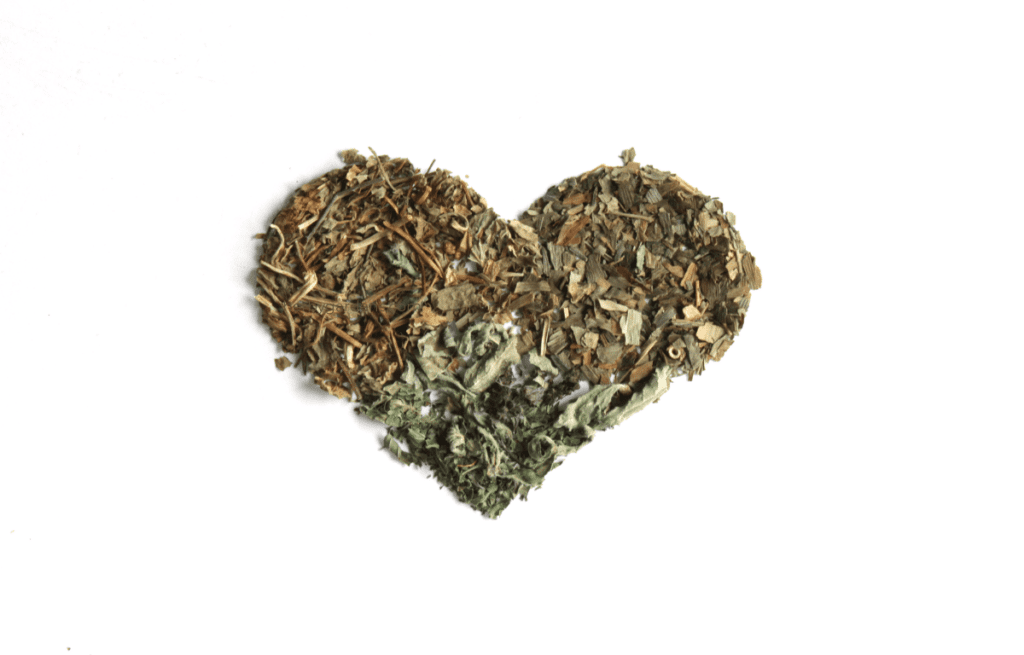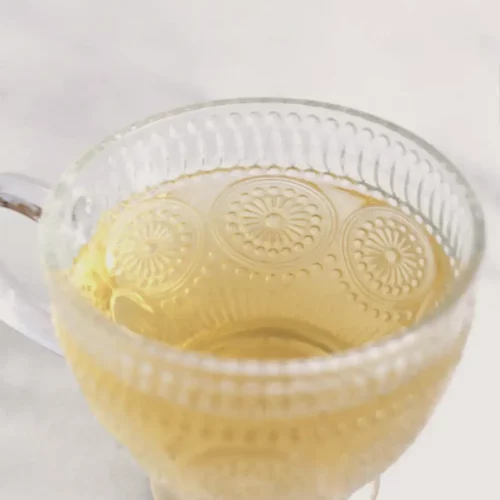Love your brain herbal tea contains herbs that support brain health. I drink this tea when I’m experiencing mental fatigue or brain fog. It can be especially helpful for students studying for exams, those under stress, or anyone who needs mental clarity or cognitive support.
You can find all the ingredients for this recipe at Mountain Rose Herbs.
Overview
The recipe involves infusing dried herbs into water and allowing them to steep for 10 minutes. Drink this tea on its own or add some honey and milk.
Equipment Needed
- Small pan with a lid
- Fine mesh strainer
- Your favorite mug or tea cup
Ingredients
- Water (8 ounces)
- Dried gotu kola leaves (1/2 teaspoon): Gotu kola helps improve memory and alertness.
- Dried ginkgo leaves (1/2 teaspoon): Ginko can help improve memory, increase circulation, reduce stress and anxiety, and even help with Alzheimer’s and dementia.
- Dried holy basil leaves and flowers (1/4 teaspoon): Holy basil has calming and stress-relieving effects.
- Dried peppermint leaves (1/8 teaspoon): Peppermint helps digestion, reduces inflammation, and provides a source of antioxidants.

Instructions Summary
- Infuse: In a small pan, bring the water to a boil then remove from the heat. Add in the dried herbs and cover the pan with a lid. Let the herbs steep in the pan for 10 minutes.
- Strain: After steeping for 10 minutes, strain the water into your favorite mug or tea cup.
- Serve: Drink the tea as is, or add milk and honey to taste.
Join Our Newsletter
Sign up for our monthly newsletter to get easy gardening tips, seasonal to-dos, and herbal recipes delivered right to your inbox.
Thank you!
Check your email to confirm your subscription.

Love Your Brain Herbal Tea
Equipment
- Small pan with a lid
- Fine mesh strainer
- Your favorite mug or tea cup
Ingredients
- 8 ounces water
- 1/2 teaspoon dried gotu kola leaves
- 1/2 teaspoon dried ginkgo leaves
- 1/4 teaspoon dried holy basil leaves and flowers
- 1/8 teaspoon dried peppermint leaves
Instructions
- In a small pan, bring the water to a boil then remove from the heat. Add in the dried herbs and cover the pan with a lid. Let the herbs steep in the pan for 10 minutes.
- After steeping for 10 minutes, strain the water into your favorite mug or tea cup.
- Drink the tea as is, or add milk and honey to taste.
Disclaimer: Many herbal teas are considered to be generally safe, although there are circumstances when you should not take a particular herb. I am providing a brief and general overview of these herbs for educational purposes only.
References
Farhana, Kun Marisa, Malueka, Rusdy Ghazali, Wibowo, Samekto, Gofir, Abdul, Effectiveness of Gotu Kola Extract 750 mg and 1000 mg Compared with Folic Acid 3 mg in Improving Vascular Cognitive Impairment after Stroke, Evidence-Based Complementary and Alternative Medicine, 2016, 2795915, 6 pages, 2016. https://doi.org/10.1155/2016/2795915
Sabaragamuwa, R., Perera, C. O., & Fedrizzi, B. (2018). Centella asiatica (Gotu kola) as a neuroprotectant and its potential role in healthy ageing. Trends in Food Science & Technology, 79, 88-97. https://doi.org/10.1016/j.tifs.2018.07.024
Tan, M.-S., Yu, J.-T., Tan, C.-C., Wang, H.-F., Meng, X.-F., & Wang, C. (2015). Efficacy and adverse effects of Ginkgo biloba for cognitive impairment and dementia: A systematic review and meta-analysis. Journal of Alzheimer’s Disease, 43(2), 589-603. https://doi.org/10.3233/JAD-140837













